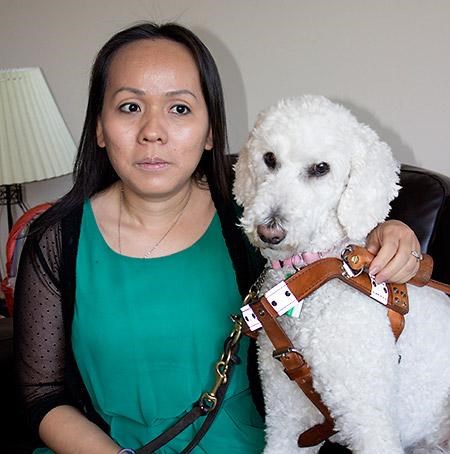Quyn Lê, like many recent Powell River residents, came here looking for something a little different.
Lê and her fiancé Hans moved here in August. Lê, a clinical therapist, has been hired by Powell River and Region Transition House Society as its new Stopping the Violence counsellor.
“I’ve always been interested in working with women and helping them to become more empowered, particularly if they’ve experienced trauma or violence in the past,” said Lê, sitting in her new office.
Dealing with life trauma is something Lê is uniquely suited to helping others deal with.
Curled up at Lê’s feet is her white poodle guide dog, Celine. Lê lost her sight at age two, then five years later she and her parents escaped from war-torn Vietnam. They fled, like many others, on a leaky boat, searching for a new home and a fresh start. Unlike others though, the boat she and her parents were on lost power in a storm in the middle of the sea and the family was set adrift. They were looted by Thai pirates who took everything of value. Finally they were rescued and placed in an Indonesian refugee camp where she lived for four years before her family was brought to Canada.
Her experiences taught her strength in the face of adversity and the power of positivity.
“The difference between being hopeless or not has a lot to do with how people interpret things and how they overcome problems and how they make sense of what is happening to them,” she said in an interview earlier in the year.
Arriving in Canada, Lê’s battles were far from over. Her next hurdle was learning English, an unfamiliar language to her. She entered high school and excelled, attaining honour roll grades and eventually graduated from McMaster University in Hamilton, Ontario. In 2010 she completed her masters degree in counselling from Simon Fraser University.
Lê said that after spending a few years being very career-oriented, doing motivational public speaking, running a private practice and working as a counsellor for Lions Gate Hospital and Canadian National Institute for the Blind, she was looking to take life a little easier.
“Our decision to move out here is to enjoy life a bit more,” she said. “I’m looking to slow down a bit.”
As a domestic violence counsellor she works with women who either have experienced abuse in the past and are trying to overcome it or women who are currently in abusive relationships.
Transition house society operates Grace House, a place for women who have been abused and are looking for temporary safe housing for themselves and their children.
“When we think about abuse we quickly imagine a woman who is beaten badly,” she said, “but this is not always so.”
Abuse can take many forms whether it be physical, emotional, social or sexual, she said.
And it does not necessarily have to come from a woman’s husband or partner either.
It could come from someone who is overly controlling or critical, like a parent or other family member, she added.
“It’s very common,” she said. “It happens across culture, age, socio-economic status and gender. Though our program supports mostly women, men get abused too, emotionally especially.”
Clients come to her either through referrals from police-based victim services or from the women themselves who are working through past abuse and just need someone to talk to.
“Experiencing abuse, especially sexual, there’s a lot of shame associated with it,” she said. “People are not used to talking.” But not coming to terms with past traumas is a recipe for future difficulty, she added.
“You see those turning into more serious issues later on,” she said, including problems with addiction, alcohol and challenges in maintaining relationships and parenting.
She said that when abuse has happened sometimes it is hard to see a way out of it and it can feel intensely isolating, but help is available. “That’s why often looking in, we can’t understand why abuse victims do not leave their abusers,” she said. “Their resources are compromised and their situation is disempowering.
“If they can reach out and get support from us, then a lot of times they may discover something about themselves they may not have known existed,” she said. “It can be very life-changing for them and their children.”
Lê said that even if her client stays with her abuser, she still tries to provide support in the form of safety plans.
“Whether someone decides to leave or not, we still support them,” she said. “That doesn’t determine whether we provide services.”
Stopping the Violence is funded by the ministry of justice, so clients are not required to pay for sessions.
For more information or to make an appointment with Lê, readers can phone 604.485.6965.



